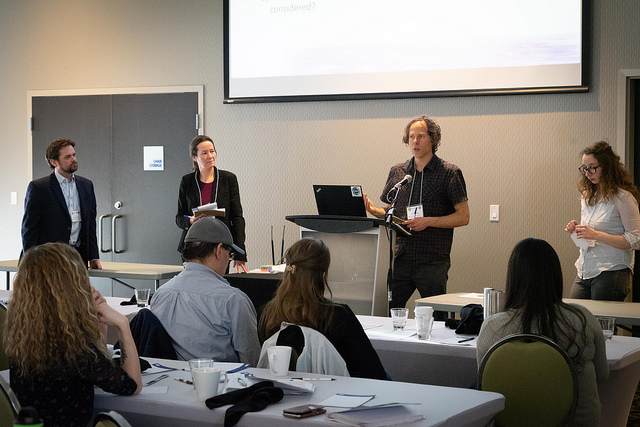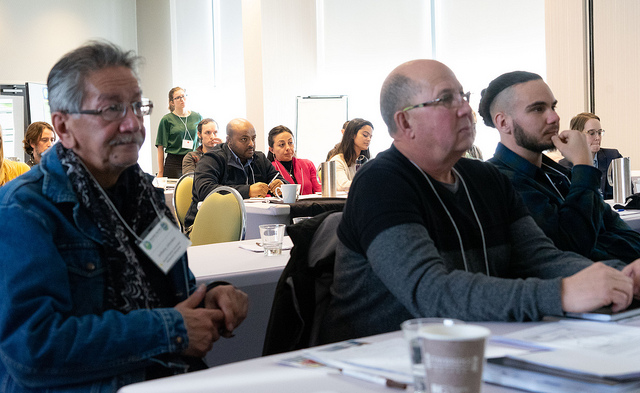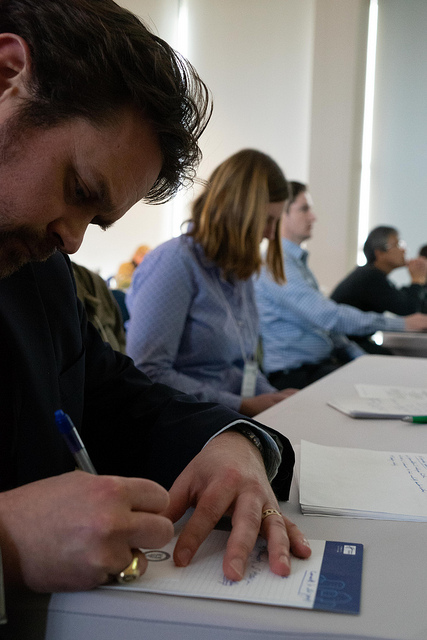Prairie Water Annual Partners Meeting 2019
Sharing the year's progress and seeking feedback from collaborators
By Jared WolfeWe held our second Prairie Water Annual Partners Meeting on January 24th and 25th, 2019 in Saskatoon, SK, at the Holiday Express Inn & Suites. Over the two days, more than 70 people, including researchers within Prairie Water, current collaborators, and those new to the project, came together to hear about research progress, contribute feedback to how the results can be used, and network around issues and opportunities to better water management on the Prairies.
Our first day focused on re-orienting, or introducing, participants to the Prairie Water project and ongoing research progress since our Kickoff meeting a year ago. We began with an acknowledgement of the spiritual aspects of water through an opening prayer performed by Elder Roland Duquette; a teaching on Indigenous traditional water ceremonies; and a ‘sharing circle’ that honoured the personal values we hold within our work with water. Through this grounding, it was acknowledged that while we might gather under a specific region or with a specific research focus or area of work, water connects us all personally, geographically, and through generations.

Our morning session went over modelling efforts, including surface hydrology and shallow groundwater recharge. Results included our watershed classification and virtual hydrological modelling. Presentations also touched on deep groundwater storage in Saskatchewan and sustainability of these resources, in particular the linkages between deep aquifers and potential for contamination from waste disposal.
After lunch, we learned how aspects of wetland nutrient processes, pesticides, and biodiversity integrate within the Prairie Water. Topics included what geographic areas might be affected by certain pesticides and how land use and climate interact to impact wetland biota. We then heard from researchers studying the economic and social aspects of water, such as the interface between science, agriculture and policy, collaborative water governance, and social learning.
Group discussions centered on user information needs, ways of linking these important new research findings and communicating them to the public. In addition, we discussed how Prairie Water might link with current local initiatives and international projects.
The poster session featured work undertaken by Prairie Water students and researchers. More than 15 posters were showcased, spanning our themes of hydrology, groundwater, wetlands, and governance. Other Global Water Futures projects with overlapping interests in Prairie water science and policy were also featured, like Agriculture Water Futures and the Integrated Modelling Program for Canada.

Day 2 began with a presentation and discussion on hydrological modelling of the unique prairie region and predictions for different scenarios of land use and climate futures. Scenarios indicated as priorities by partners and end users at last year’s Kickoff meeting were integrated into these modelling and prediction runs. Group discussion generated more feedback on realistic scenarios and parameters to model for future work, such as riparian changes and water storage. The next steps are to link these outputs to the research being conducted across Prairie Water to generate a more holistic understanding of the response of watersheds under changing climate and management possibilities.
We brought all of the presentations and discussion together in a final activity that asked participants to engage in a water management decision-making exercise led by the Prairie Water governance team. Participants walked through 5 different land management options and made decisions based on available evidence and personal assumptions. Participants were asked to weigh the options on draining a wetland afforded by regulations and fines, beneficial management practices, and information campaigns. A lively discussion was had about the influences of making their decision and participant thoughts on the best options. This pilot exercise will use the feedback from participants to refine methods for potential use in decision-making activities in partnership with different stakeholder groups in the future.

Key outcomes and future needs that were identified from participants’ feedback:
- Identify streams of results that might be brought to the public in the short-term and others reserved for longer-term research purposes.
- Linking with other projects in Global Water Futures and initiatives in our network.
- Continue by engaging with partners on a smaller, more targeted basis to discuss needs in light of Prairie Water findings, including opportunities for student involvement.
- Testing the integration of our various research methods and findings into a comprehensive model for understand implications for water under changing land and climate futures.
On behalf of the Prairie Water team, we would like to thank everyone for attending and for their contributions to the science and the discussions. We were very excited to share the project’s progress so far with our partners and the feedback you have given will continue to be used to inform the research. This is particularly important as we move into thinking about packaging and sharing results for effective use in your own work.
View the event summary here: Prairie Water Annual Partners Meeting 2019

